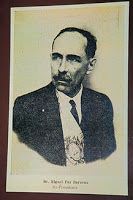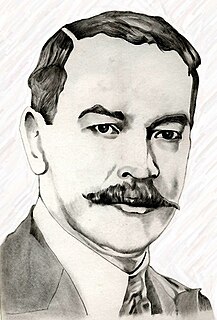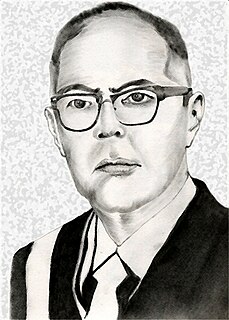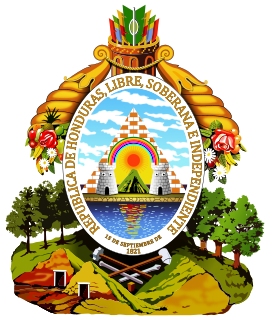A general election (Spanish : Elecciones generales de Honduras de 1924) was held in Honduras on 28–30 December 1924. Voters went to the polls to elect a new President of the Republic and a new Congress.

Spanish or Castilian is a Romance language that originated in the Castile region of Spain and today has hundreds of millions of native speakers in the Americas and Spain. It is a global language and the world's second-most spoken native language, after Mandarin Chinese.

Honduras, officially the Republic of Honduras, is a country in Central America. In the past, it was sometimes referred to as "Spanish Honduras" to differentiate it from British Honduras, which later became modern-day Belize. The republic of Honduras is bordered to the west by Guatemala, to the southwest by El Salvador, to the southeast by Nicaragua, to the south by the Pacific Ocean at the Gulf of Fonseca, and to the north by the Gulf of Honduras, a large inlet of the Caribbean Sea.
Contents
After a destructive three-cornered civil war in 1924, “the National Party of Honduras nominated Miguel Paz Barahona for president. The Liberal Party of Honduras, after some debate, refused to nominate a candidate”. [1]

The National Party of Honduras is a political party in Honduras founded on February 27, 1902, by Manuel Bonilla Chirinos. Historically it has been one of the two most influential parties in the country. The party's platform is based on Christian humanist doctrine, and its five main principles are common wealth, dignity of the human person, equality, solidarity and subsidiarity.

Miguel Paz Barahona was President of Honduras from 1 February 1925 to 1 February 1929. Barahona was a member of the National Party of Honduras (PNH).

The Liberal Party of Honduras is a centre-right liberal political party in Honduras that was founded in 1891. The party is a member of the Liberal International. The PLH is identified with the color red and white, as the flag Francisco Morazan used in most of his military campaigns during time of the Central American Federal Republic.
“Presidential and congressional elections in 1924 led to the single candidacy of Miguel Paz Barahona, who won the presidency with about 99 percent of the vote. … Paz Barahona became president primarily because U.S. diplomats stressed the 1923 General Treaty of Peace and Amnity accords and opposed Tiburcio Carías Andino’s candidacy. In fact the period of Paz Barahona’s term represented the first time in 20th-century Honduran history that a sitting president did not enjoy full control over the official policy of his party”. [2]

Tiburcio Carías Andino was a Honduran military man with a reputation as a strongman. He founded the National Party of Honduras in 1918, and was President of Honduras twice; briefly in 1924 and from 1933 to 1949.
“Cuyamel Fruit Company was backing the Liberals while United Fruit was betting on the Nationalist horse. President Paz Barahona, however, was estranged from the bulk of his party and soon found himself in Cuyamel Fruit Company’s harness”. [3]
Cuyamel Fruit Company, formerly the Hubbard-Zemurray Steam Ship Company, was an American agricultural corporation operating in Honduras from 1911 until 1929, before being purchased by the United Fruit Company. Samuel Zemurray, a Jewish Russian immigrant to the United States, founded Cuyamel to export bananas and sugar from the northwestern Cortés region of Honduras to international markets. Zemurray would later become the head of the United Fruit Company. Both Cuyamel and United Fruit are corporate ancestors of the modern-day firm Chiquita Brands International.




